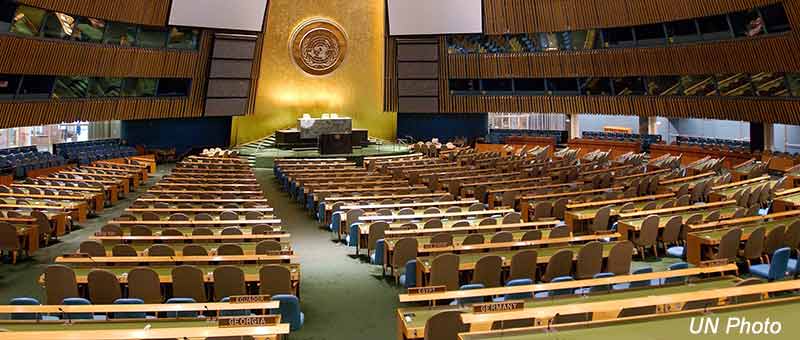- World
- Nov 15
UN General Assembly adopts resolution on Russian reparations for Ukraine
• The UN General Assembly adopted a resolution that calls for Russia to pay war reparations to Ukraine, as ambassadors met to resume their emergency special session devoted to the conflict.
• Nearly 50 nations co-sponsored the resolution on establishing an international mechanism for compensation for damage, loss and injury, as well as a register to document evidence and claims.
• The draft resolution introduced by Ukraine was adopted in the 193-member UN General Assembly by a recorded vote of 94 in favour, 14 against and 73 abstentions, including by India, Bangladesh, Bhutan, Brazil, Egypt, Indonesia, Israel, Nepal, Pakistan, South Africa and Sri Lanka.
• Those voting against the resolution were Belarus, China, Cuba, North Korea, Iran, Russia and Syria.
• General Assembly resolutions are non-binding, but they carry political weight.
• India has mostly abstained on resolutions related to the Russia-Ukraine war in the UN, including in the Security Council, General Assembly and the Human Rights Council.
• India, in its explanation of vote after the draft was adopted, questioned whether a reparation process would contribute towards efforts at resolving the conflict and cautioned against precedents being set through such resolutions.
UN General Assembly (UNGA)
• The General Assembly is the UN’s most representative body, comprising all 193 Member States.
• Established in 1945 under the Charter of the United Nations, the General Assembly is the main policy-making organ of the Organisation.
• It provides a unique forum for multilateral discussion of the full spectrum of international issues covered by the Charter.
• It also plays a central role in the process of standard-setting and the codification of international law.
• The Assembly meets from September to December each year (main part), and thereafter, from January to September (resumed part), as required.
• In addition to its regular sessions, the Assembly may meet in special and emergency special sessions. To date, the Assembly has convened 32 special sessions and 11 emergency special sessions.
• Each of the 193 Member States in the Assembly has one vote. Votes taken on designated important issues – such as recommendations on peace and security, the election of Security Council and Economic and Social Council members, and budgetary questions – require a two-thirds majority of Member States, but other questions are decided by a simple majority.
Functions and powers of the General Assembly:
According to the Charter of the United Nations, the General Assembly may:
• Consider and approve the United Nations budget and establish the financial assessments of Member States.
• Elect the non-permanent members of the Security Council and the members of other United Nations councils and organs and, on the recommendation of the Security Council, appoint the Secretary-General.
• Consider and make recommendations on the general principles of cooperation for maintaining international peace and security, including disarmament.
• Discuss any question relating to international peace and security and, except where a dispute or situation is currently being discussed by the Security Council, make recommendations on it.
• Discuss, with the same exception, and make recommendations on any questions within the scope of the Charter or affecting the powers and functions of any organ of the United Nations.
• Initiate studies and make recommendations to promote international political cooperation, the development and codification of international law, the realisation of human rights and fundamental freedoms, and international collaboration in the economic, social, humanitarian, cultural, educational and health fields.
• Make recommendations for the peaceful settlement of any situation that might impair friendly relations among countries.
• Consider reports from the Security Council and other United Nations organs.
Manorama Yearbook app is now available on Google Play Store and iOS App Store


